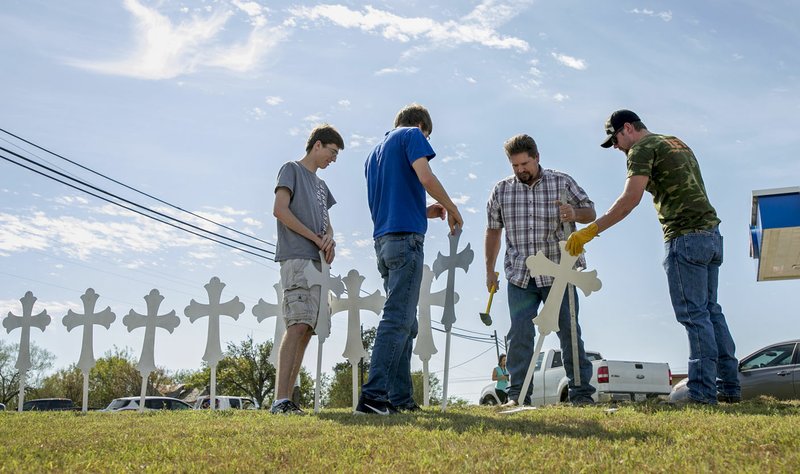Before the church massacre in Sutherland Springs, Texas, there was the church massacre in Charleston, S.C. It was enough to make the Rev. John Darsey think that his young Georgia church needed a security plan -- one that involved defenders with firearms.
So his church, Redeemer Church of Madison in Georgia, hired three uniformed sheriff's deputies for each Sunday service, one directing traffic, one in the parking lot, and one right by the door.
This is the visible deterrent -- the first line of defense.
The second, more subtle layer is an in-house security team of church members with military or law enforcement backgrounds, all carrying concealed weapons. Inside the spare, spacious modern sanctuary -- where some 500 people come every Sunday morning -- the team members split the room into quadrants, with one always keeping a bird's-eye view from the back of the room, on the riser with the sound and lighting equipment.
The third layer of protection is one that Darsey knows is there, though he has trouble quantifying it. He estimated that about 20 to 25 of his flock were concealing a weapon on any given Sunday. "Now that's just the ones I know about," he said.
And there were other weapons around. "Including here," he said, opening a drawer of his big wooden desk.
Around the country, a string of threats and attacks in recent years has led many houses of worship to take steps to secure their sanctuaries. And after 26 people were killed at First Baptist Church of Sutherland Springs on Nov. 5, many more have begun looking hard at whether God's protection might need some armed backup.
In Plano, Texas, Prestonwood Baptist Church, a megachurch with more than 43,000 members and a model of modern-day vigilance -- with off-duty police, private security, and cameras monitored 24 hours a day -- offered to hold a seminar on church security after the Sutherland Springs shooting.
Within 48 hours, more than 250 ministers and lay leaders from more than 100 churches in four states had signed up.
"This has caused every church in the country to think about the security of their people, and how that has to be of utmost importance," said the Rev. Mike Buster, Prestonwood's executive pastor.
But securing a house of worship poses very different challenges from securing other public places like airports, schools or theaters.
For one thing, most U.S. congregations are relatively small -- two-thirds have fewer than 100 regular attendees, according to data from the National Congregations Study -- and lack the staff or the budget for extensive security.
Just as important, many clergy members say that the very mission of houses of worship leaves them conflicted over imposing security measures. A church, temple or mosque should be a welcoming place, they say, with doors kept wide open to strangers and those who are hurting.
Many say they have ministered to people in all kinds of crises -- homelessness, drug addiction, domestic abuse, or trouble with the law -- without being sure whether they are intent on harm.
"The safe thing to do is to isolate yourself from these people, but that's the wrong thing to do for a church," said the Rev. Bart Barber, pastor of First Baptist Church of Farmersville, Texas, who wrote an essay for Christianity Today about the security dilemma for small rural churches.
"We're not going to cordon off the block, and make people show their ID and do a fingerprint background check to get into the worship service," Barber said. "Because the very people we're afraid of are also the people we are here to help."
In areas of the country where many people own and carry guns, church security is complicated by the question of whether to allow or even encourage guns in church.
Texas law allows houses of worship to bar firearms, and many do, posting signs saying that carrying guns onto the property is prohibited. The United Methodist Church adopted a resolution suggesting that churches post such signs in 2016, part of a larger statement on ending gun violence. Mormon church policy says that carrying firearms is "inappropriate except as required by officers of the law."
Jason Singleton, 36, is among the members who brings a handgun to Redeemer, in his case, strapped to his torso with a belly band. He said he would never pull the gun if there was merely a fight. There had to be an armed attacker, shooting innocents.
"It would be a last resort," he said. "If I took someone's life it would be because mine was about to be took or someone else's, and I think I'd be OK with answering for that, in the by and by."
Religion on 11/18/2017

